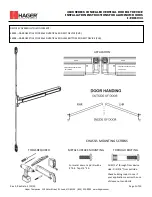
7
INSTALLATION EXAMPLES
(CONT'D)
DIRECT CONNECTION of both the ERV SUPPLY AIR STREAM and EXHAUST AIR STREAM
to the FURNACE COLD AIR RETURN
SIMPLIFIED INSTALLATION
(GOOD)
(RETURN/RETURN METHOD)
Suggested installation for:
• When bathroom and kitchen
already have local exhaust
system
• May be suitable for
retrofitting
Benefits:
Least expensive
installation type
1. Furnace blower must operate when ventilation from ERV is required. The furnace should
be set to run continuously or interlocked with ERV.
See furnace electrical connection
on page 15.
2. A minimum separation of 1m (39’’) is recommended between the two direct
connections.
3. In order to prevent exhausting any fresh air, the ERV’s exhaust air connection should be
upstream of the ERV’s supply air connection when ducting to the furnace’s cold air return.
4. Due to the difference in pressure between the ERV and the equipment it is being
connected to the ERV’s airflow must be balanced on site, using the procedure found in the
section “AIRFLOW BALANCING”
* In the case of a multi-zone system, please contact Fantech customer
service prior to installing any installation type requiring the use of the
furnace interlock"
Air from inside
* Unit air flow should be balanced while ERV is on "Normal" speed and
furnace blower is running.
1 m (3' 3")
min.
recommended
Cold air
return
* Ductwork layout may dif-
fer depending on model
ERV/Furnace ducting for Simplified Installation - Option 1
Stale air to
outside
Fresh air from
outside
Fresh air to
living areas
Fantech energy recovery ventilators (ERV) that use a supply fan shutdown for frost preven-
tion do not include an outdoor air motorized damper. If you are using a simplified instal-
lation, i.e. connecting the ERV supply air duct to a furnace's return air duct, the ERV must
operate continuously. When the ERV is turned off, no warm exhaust air will flow through
the ERV but the furnace's fan will continue to draw in outdoor air directly into the furnace.
If it's cold outside, cold air will be introduced, without re-heating, directly into the furnace.
If the ERV is installed such that the homeowner may turn off the ERV during the winter, we
recommend installing a motorized damper between the ERV's supply air and the furnace's
return air duct that closes when the ERV is not operating. See wiring diagram (figure 1).
You may also choose to use a Fantech ERV that uses a recirculation defrost that incorpo-
rates an outdoor air damper.
Damper
Motor
24 VAC Transformer
COM
NO
ERV Furnace interlock
See page 15.
24V
120V
Figure 1
*Transformer and Damper motor not included
Motorized
damper
1 m (3' 3")
min.
recommended
Air return






































